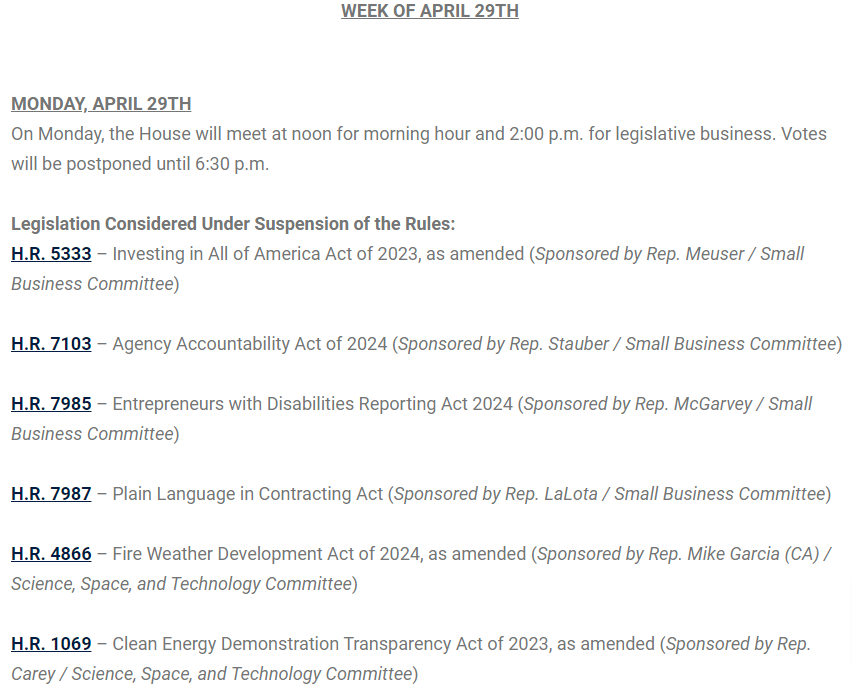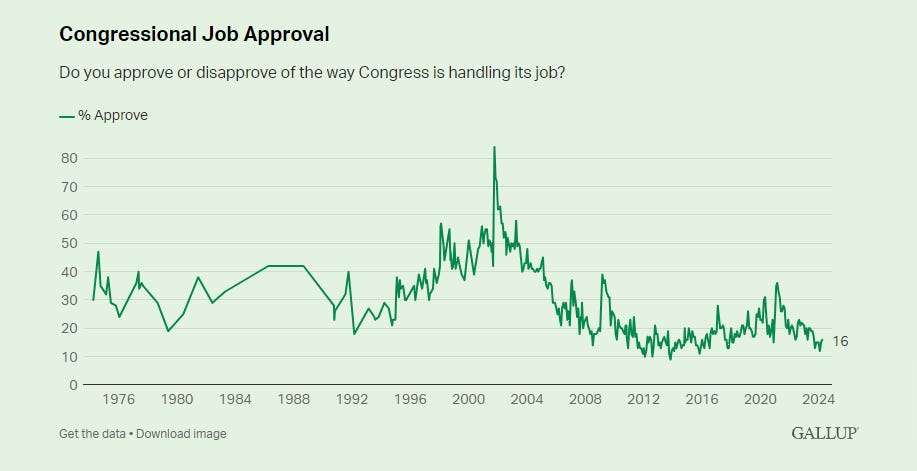
Source: MajorityLeader.gov.
Yes, Congress has troubles. The budget process is in shambles. It suffers a surfeit of mindless partisanship. Our national legislature often dawdles until a crisis hits and then acts retroactively. Legislators have needed help overseeing the administrative state for years but have not bothered to create a Congressional Regulation Office or bolster its cohort of committee wonks.
Look, my name is on the cover of a book titled Congress Overwhelmed—I’m not pollyanna about the First Branch. I get the gripes.
But the complaint that Congress is not doing anything substantive is just wrong. Even the current Congress, you know, the one that had a Speaker getting booted and all sorts of drama—yes, even this Congress is getting things done.
Yeah, yeah, I can hear some readers thinking, the Congress passed those four foreign affairs and national security bills. So what—that’s all they have done.
Well, no. Just look at this list of bills scheduled for a House vote the week of April 29. Legislators and their staff have been working away for who knows how long to get them ready. Yet you likely have seen few if any stories on all this work, and you probably won’t see many articles or TV news stories about the votes on these bills.
And this is to say nothing about the ongoing oversight activities that both chambers have engaged in. Surf to Congress.gov and you can delve into the various committee doings. Oh, look, the House is discussing wolves and whether they should remain protected, and holding a hearing on NASA’s budget.
The average voter is unlikely to have the time an inclination to do their own research on Congress. That’s always been the case—just read Walter Lippmann’s The Phantom Public, which was published in 1925. Lippmann noted that all the rah-rah-ing about getting Americans more involved in civic affairs was doomed to fail. Why? Because Americans have lives to live and responsibilities to attend—jobs to do, families and homes to tend to, etc. They do not have time each day to read up on governance—besides, there is too much happening for anyone to follow.
What the public needs is for the media to help them learn about governance by serving up digests on the doings of government. Keep it short, simple, honest, and cognizable.
Unfortunately, much of the coverage of government focuses on campaigns, political conflict (real and otherwise), and scandals (alleged and actual). It’s all about who is up or down, and the narrative.
For many media outlets, the daily grinding away on Capitol Hill is considered too boring to spill much ink on. Such coverage is mostly relegated to publications that politics nerds, lobbyists, and the special interests will pay for. (Although increasingly even these publications are trying to survive by giving away their content and running advertisements.)

Source: Gallup.com.
So here we are, with public opinion exceedingly sour even though Congress is doing things—things that voters may sometimes like.
If anyone can figure out how to fix this situation, I bet there are deep-pocketed philanthropists who would be eager to help.
Kevin R. Kosar is a senior fellow at the American Enterprise Institute. He worked for more than a decade as a nonpartisan researcher at the Library of Congress’s Congressional Research Service. Kevin also hosts the Understanding Congress podcast and is co-editor of the book, Congress Overwhelmed: Congressional Capacity and Prospects for Reform.
Stay in the know about our news and events.